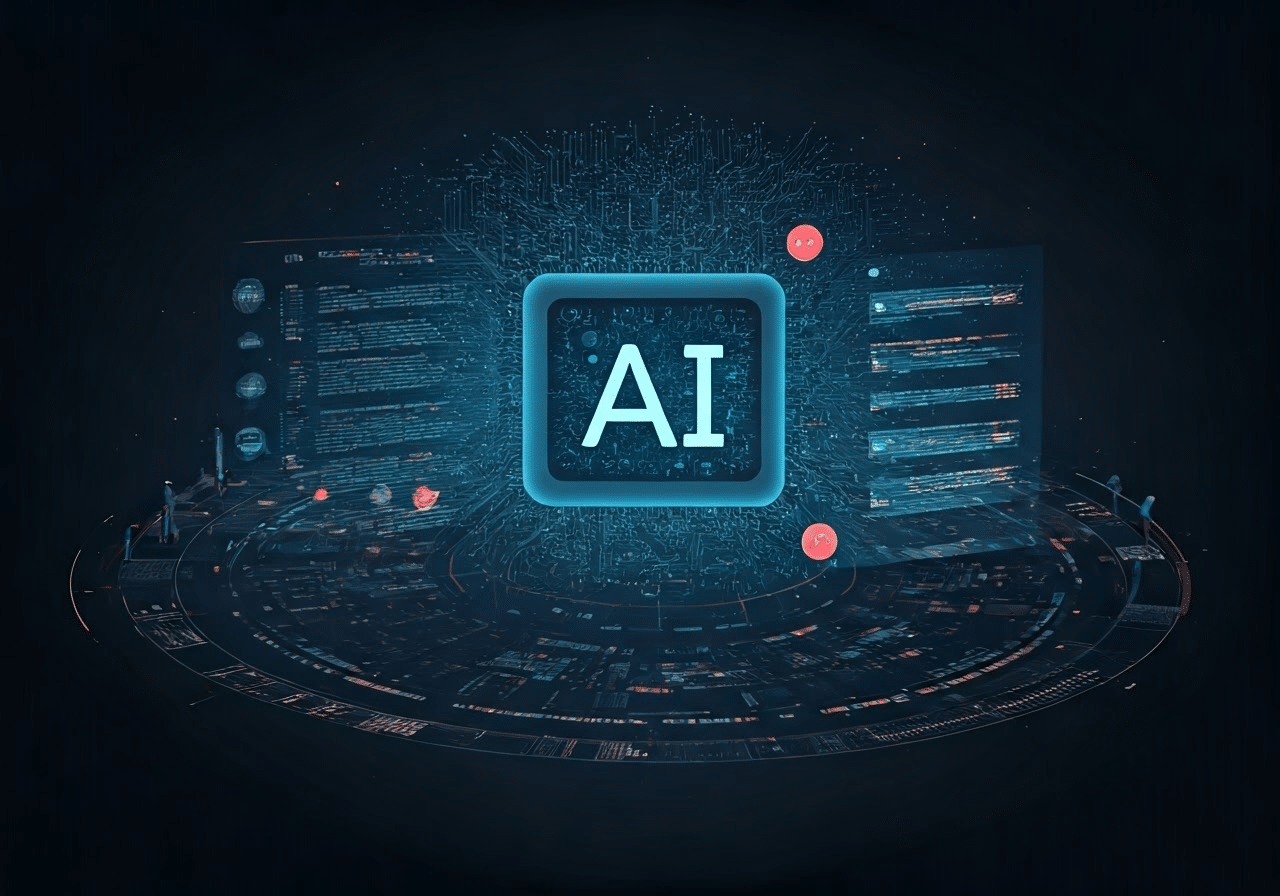AI code generation is changing how software is made. It helps make writing, fixing, and improving code easier. This new area in generative AI allows developers to write accurate scripts, automate boring tasks, and concentrate on more complex problems. By using natural language, AI tools like GitHub Copilot and OpenAI Codex produce script snippets through chat, improve the development experience, and work with many programming languages. As AI advances, AI-generated code is set to influence the future of software development greatly.
What is AI-generated code, and how does it work?
AI-generated code refers to a software script produced by artificial intelligence algorithms. These systems analyze vast amounts of existing script, learn patterns, and generate new code snippets based on user input or requirements. This streamlines development processes, reduces human error, and enhances productivity by automating repetitive coding tasks.
Exploring How AI-Generated Code is Revolutionizing Software Development
AI-generated code gives great help to developers. It makes work faster and improves script quality. This technology takes care of repetitive tasks, like fixing syntax, organizing structure, and generating documentation. As a result, developers can stop worrying about complex manual work. They can enjoy more time for strategic thinking.
Also, AI code generation helps create teamwork in coding. It works well with current tools and offers suggestions in real-time. This helps both skilled programmers and beginners in coding. Let’s look at how it changes important parts of software development.
1. Enhanced Coding Efficiency and Speed with Python, Java, or JavaScript
With AI code generation, developers can work much more efficiently on coding tasks. The speed improves as artificial intelligence tools predict and complete lines of script in real-time. This lets the development process go smoothly. Tasks that are repetitive, like making data models and setting configurations, are automated. This saves a lot of time and effort.
AI tools also help maintain efficient code through script reviews by using consistent coding styles in projects. Whether you are working in Python, Java, or JavaScript, tools like GitHub Copilot give you suggestions based on best practices. This cuts down on unnecessary lines of script and makes projects easier to scale.
Moreover, developers can interact with AI using natural language prompts to ask for specific functionality. Instead of worrying about syntax details, AI takes care of the hard work. This helps developers focus more on strategic planning, project architecture, and innovation. These changes show how AI-generated code is transforming the development process.
2. Automated Debugging and Error Correction
One of the hardest parts of software development is making sure the script is error-free. AI script generators help by quickly finding errors and fixing them based on real-time analysis. They prevent common coding mistakes during the development process, fixing problems before they become bigger.
For example, tools like Codiga and Tabnine offer strong error correction options, making sure code quality meets industry standards. Developers get useful suggestions for improving script structure while AI takes care of repetitive debugging tasks, like writing or removing unnecessary debug statements.
These tools also run scans for security vulnerabilities to protect projects from potential threats. Whether it’s fixing early bugs or tackling serious errors, AI tools can predict problems and give reliable solutions right away. Automated debugging makes tough tasks easier, helping developers focus on creating smart and functional software designs.
3. Personalized Chat Script Suggestions GitHub Copilot
AI code generation tools improve how we code by giving personal suggestions that fit our needs. These tools look at your codebase and suggest changes that match your coding style and project goals. This helps make coding easier while lowering the learning curve for new coding setups.
Developers get helpful prompts that include a chatbot relevant to their context. This makes it easier to turn complex ideas into a script. For example, GitHub Copilot can create specific code snippets for building APIs based on what you have done before. This type of personalization leads to better and more focused coding results.
Also, AI tools help new programmers with step-by-step support. New developers can pick up coding concepts faster with tools like OpenAI Codex, which offers script samples and explanations. By making output personal and helping newcomers, AI creates a friendly and productive time during the coding process.
4. Integration with Existing Development Tools
AI code generators are made to work easily with your favorite development tools, supporting a wide range of programming languages. They help you be more productive without changing your usual workflows. Whether you are using IDEs like Visual Studio or frameworks like React or Django, these tools fit smoothly into your coding setup.
This integration improves how things work by letting artificial intelligence tools connect with API schemas, repository structures, and even configuration files. For instance, Amazon CodeWhisperer adjusts its output to fit your AWS cloud applications. It gives suggestions that help improve your project efficiency.
This connection also helps when working with teams. AI-powered workspaces let developers share scripts and see updates in real-time. This makes the script development process smoother. By linking different tools and workflows, code generation software boosts your productivity and supports good teamwork across projects.
5. Scalability and Adaptability in Various Programming Languages
One key feature of AI code generation is its ability to work well with different programming languages. Tools like Tabnine and CodeGeeX are flexible and adapt to your coding setup. They help you easily switch between languages like Python, Java, JavaScript, PHP, and many others.
AI generators also improve adaptability by quickly translating code from one platform to another. They can change Python functions into JavaScript or update old scripts from older systems. This helps keep everything working smoothly and compatible while needing little manual work.
These tools are great for bigger projects, too. AI tools improve coding speed across various languages and frameworks. They support complete development plans. This flexibility makes them very useful for developers dealing with different technologies and tough requirements. Their importance in driving future software development is clear.
Key Technologies Behind Internet AI-Generated Code
The tools that create AI-generated code come from advanced methods of computing. Machine learning models play a key role in predicting script completion and analyzing patterns. These models help create solutions that fit specific use cases, improving the overall coding experience.
Natural language processing (NLP) also helps connect human language with code syntax. This makes it easier for developers to work with AI. Moreover, neural networks help recognize patterns in existing script structures. This allows AI to work smartly in different coding situations.
Machine Learning Models in Code Generation
Machine learning models, including large language models (LLMs), are key to today’s AI code generators. They help predict outcomes and provide context-driven suggestions. These models look at source code repositories and user inputs. They offer useful suggestions based on past data and best practices.
For example, OpenAI Codex uses large language models, including Gemini, to support tools like GitHub Copilot. This helps developers with accurate code completion. These models keep learning and adjusting their outputs to fit new programming trends and what users need.
Deep learning makes machine learning even better for creating complex script structures. It works with many programming languages. By handling large amounts of data, AI models keep improving coding methods. This leads to better outputs that help speed up development and boost productivity in coding workflows.
Natural Language Processing for Understanding Context
Natural language processing, or NLP, makes it easier for developers to work with AI code generators. It turns normal language into natural language text script instructions. With NLP’s skills in understanding context, tools like GitHub Copilot and Amazon CodeWhisperer can change simple prompts into exact script snippets.
This technology helps developers skip over tricky syntax details. They can focus more on what the function needs to do. Whether you are talking about a new API or explaining database tasks, NLP connects what people understand with what machines can do. This leads to easier coding experiences.
NLP also helps explain existing code by providing insights into complex parts. This way, developers can learn about new projects more easily and help out better. By mixing language with coding, NLP changes how we think about user-friendly software development.
Neural Networks for Pattern Recognition in Script
Neural networks are important in AI-generated code. They recognize and analyze patterns in coding environments. These smart systems can spot repeated patterns, common vulnerabilities, and ways to improve lines of script.
Tools like Tabnine and CodeGeeX use neural models that learn from a lot of training data. This helps the generated solutions meet industry standards. By finding patterns in current codebases, neural networks suggest useful improvements. This makes coding more scalable and adaptable across different programming platforms.
Also, pattern recognition allows smooth software upgrades. It helps developers update old systems without issues. Neural networks can update frameworks while keeping important variable references and coding logic intact. Their ability to learn and understand structure promotes strong and high-performing coding workflows. This also improves overall development strategies.
Real-World Applications of AI-Generated Code
In the real world, AI-generated code is helping organizations in different industries to make their development processes better. Big companies like Google and Amazon are using this technology to improve their coding workflows. This makes their large projects more efficient and accurate.
At the same time, startups are using AI assistants to speed up innovation. These tools lower the costs of development and help get MVPs ready faster. By supporting various teams and giving simple coding instructions, AI tools help fill skill gaps and resource needs. Let’s explore these important uses of AI in tech environments.
Streamlining Development With Amazon, Google, & Microsoft
Tech giants like Amazon, Google, and Microsoft are using AI code generation to meet tough development needs. They use tools like Amazon CodeWhisperer to create and grow coding projects quickly, making sure they work well.
AI-generated solutions help workflows by spotting repeated coding patterns and automating setup for important systems. For example, OpenAI Codex, an AI code completion tool, works well with current repositories. It helps with steady productivity and does code completion without errors.
These companies also gain from AI’s power to secure codebases. Scanning for vulnerabilities helps keep vital systems strong, reducing risk while boosting innovation. In today’s fast-moving tech world, using AI code tools is a smart choice to enhance functionality and scalability.
Boosting Startup Innovations with AI Assistants
AI coding tools are changing how startups work by providing great flexibility and help during coding. Platforms like Tabnine help creators make faster prototypes. This supports startups in creating MVPs with less coding effort.
AI assistants close the skill gaps by turning complex coding steps into easy-to-follow formats. They offer clear guidance for new developers, which boosts innovation and team development. Integration with repositories lets startups keep their coding organized without much manual work.
These tools cut down on switching tasks and help with repetitive jobs. This gives startups extra time to think and create. AI-driven coding gives these lean startups a leg up as they try to deliver effective software solutions quickly.
Conclusion
AI-generated code is changing the way software development happens. It is helping developers work better. With faster solutions, automatic fixing of issues, and tailored help, using AI makes solving problems and creating new ideas quicker. As this technology grows, it brings new chances for scaling up in various programming languages and for companies of all sizes. Additionally, utilizing AI can assist in creating test cases, making the process more efficient. Using AI in coding is not just helpful; it is becoming necessary to stay relevant in today’s fast-paced tech world. If you want to look into the benefits of AI for your projects, feel free to ask for help and support.
Frequently Asked Questions
How does AI code generation impact traditional programming?
AI code generation improves traditional programming. It automates boring tasks and gives helpful suggestions based on context. This makes coding easier, especially for beginners. It creates the necessary script and cuts down the learning curve. As a result, developers can focus more on solving bigger problems instead of worrying about syntax issues.
Besides pricing, what are the limitations of AI in code generation?
AI tools for code generation have their limits. They can produce inconsistent script quality. There may also be security vulnerabilities to think about. Plus, they might struggle to meet specific requirements. While these tools help automate some tasks, they often lack the detail needed for highly customized or unique programming jobs.

Zak McGraw, Digital Marketing Manager at Vision Computer Solutions in the Detroit Metro Area, shares tips on MSP services, cybersecurity, and business tech.

